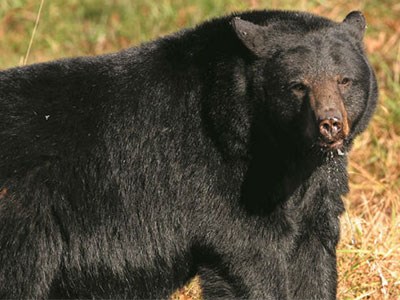Two years ago, when cold weather meant a late spring, the number of Sudburians encountering bears on city streets and backyards soared.
Between April and December 2016, there were 1,470 bear calls in the city. Police were regularly being called to neighbourhoods where bears were popping up, city councillors were getting a stream of complaints from worried residents and social media was filled with videos and pictures of bruins in backyards, garbage bins and trees.
A committee was struck – including city representatives, police and the Ministry of Natural Resources and Forestry – to find ways to address the problem. City council passed a bylaw requiring residents to keep garbage bags away from the curb until 5:30 a.m. on pickup day, although that decision was reversed after a public outcry.
Last year, with a more routine spring, the number of bear complaints dropped to 571. But the snowstorms and freezing temperatures this spring have created potentially similar conditions to 2016. After a slow start – 36 in April – the number of bear calls as of May 10 have already exceeded 70 on the city's bear reporting map.
Karen Passmore, a spokesperson for the MNRF in Sudbury, said spring is about three weeks late as the province's 85,000-105,000 bear population emerge from hibernation.
"But given the weather, things do seem to be happening a bit faster right now,” Passmore said. “So we're at a wait-and-see stage for natural foods. What that means is people are going to have to be extra vigilant."
She said the best way to prevent a bear from getting in your yard is to ensure there's nothing there to attract them – especially garbage and bird seed and suet.
"Bears are just waking up from hibernation right now, and finding food is job No. 1 for them -- especially easily accessible food," Passmore said. "If they can't find natural foods, and they can smell something and it's easily accessible, then that's what they're going to go for.
"Bears have a really good sense of smell -- and what smells like bad garbage to us can smell like a buffet to a bear."
The bruins will travel up to 100 kilometres to find food, she said, and can find the same feeding source again.
"Bears are shy of humans, but they are very smart,” Passmore said. “They will remember where they got their last meal. If it was somebody's garbage, they will come back again and again and again. That's why we say the best way to stop a bear problem is to not create one in the first place."
She offered several tips to help people avoid attracting bears:
- Do not put bird feeders out in the spring, summer and fall. Bears love birdseed as it is high in calories and easy to get. Bears also love the sugar water from hummingbird feeders, which is high in calories. If you’d like hummingbirds to visit your property, plant natural plants for hummingbirds to enjoy.
- Always ensure that any garbage you have is kept inaccessible to bears. An easy way to do this is by freezing food scraps until the day of pick up or until you go to the dump. Rotting food in a garbage can on a hot summer day smells really bad – but not to a bear. One idea is to throw an old ice cream container in the freezer and scrape your non-compostable food waste into it until garbage day.
- Cleaning your garbage cans out regularly will also reduce the chance of a bear visiting your home. A little bit of bleach wipes out most smells.
- After you are done cooking that chicken breast or steak on the BBQ, burn the grease off the grills and remove the grease trap. Bears will often be attracted to BBQs because of the strong smell of grease. A clean BBQ has less of a chance of being investigated by a bear.
- If you compost make sure you are composting correctly. Properly functioning compost should have little to no smell and be of little interest to a bear. Pile grass clippings or leaves on top of the food waste, turn it over weekly with a pitchfork to allow air to pass through the pile and ensure that the material is decomposing instead of rotting. Do not put oils, fats, meat or sweets in the compost.
- Do not put garbage out the night before pickup. That gives bears, raccoons, skunks and all manners of wildlife ample opportunity to get into it, creating an unsafe situation for you and your neighbours. Put your garbage out the morning of pickup, or take it to the dump weekly.
- Do not feed wild animals and keep all pet food indoors. Ensure livestock feed is kept inaccessible to bears.
- If you have fruit trees, ensure all ripe fruit is picked and any fallen fruit removed so they are not rotting and creating a smell for bears to investigate.
- Other interesting facts about bears:
- Once mature, a female bear only has cubs at best once every two years. This is because cubs stay with their mom for about 17 months, and don’t end up finding their own territory until their second summer.
- Adult males can have home ranges up to 1,500 square kilometres, females 25 – 50 square kilometres
- A reminder to people as well that if a bear poses an immediate threat to public safety by exhibiting threatening or aggressive behaviour, call 911 or your local police. At the request of the police, MNRF will respond to emergency situations during daylight hours.
- For non-emergency situations, people can call the Bear Wise Reporting Line (1-866-514-2327), available 24/7, from April 1 to Nov. 30.
